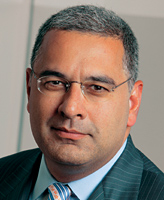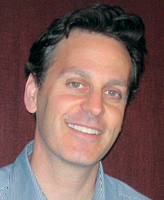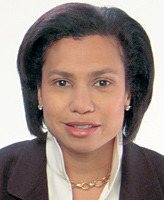Kellogg
finance expertise well represented among alumni leaders in
fund management
By
Gary Wisby
The greatest proof of the Kellogg School's
finance acumen is the success of its alumni who have launched
exceptional Wall Street careers — particularly those
graduates who have helped to establish innovative investment
instruments.
 |
|
| Finance
Professor Robert
McDonald, one of the Kellogg thought leaders inspiring
alumni success Photo
© Nathan Mandell |
|
| |
|
|
|
| |
|
People
like Sunil Hirani.
When
Hirani '94 co-founded Creditex, now a leader in trading credit
derivatives, in 1999, he vastly underestimated how big the
market for its services would become. "Today we do as
much volume in two or three days as we did in all of 2002,"
he says.
Credit
derivatives — a type of security that investment professionals
use to manage the risk of corporate defaults — have
grown from zero in 1997 to a market of more than $23 trillion
today. "A whole infrastructure is being built up out
of thin air," Hirani says.
His
No. 1 concern today is staying a step ahead of the competition
and his clients. He and his team do this by trying to differentiate
the company's services and "looking for gaps in services
that our competitors are providing," he says. Creditex
also relies on innovation "to execute better, faster,
more economically, to make our clients more efficient,"
says Hirani, adding that he and his colleagues try to have
fun while negotiating the heady world of investment.
He
characterized today's market as "very, very competitive"
and his clients as "aggressive and demanding about minimizing
total transaction costs and improving overall service levels."
At
Kellogg, Hirani says he learned the importance of branding,
"creating and building a brand that has value."
He also learned the power of the team. "It's the resource
that's in shortest supply these days," he says, "and
we try harder every day to be better at recruiting, retaining
and cultivating."
For
David Kabiller '87, founder of AQR Capital Management
LLC, a Las Vegas analogy proves useful in describing what
his firm needs to do. "No matter how long you play, at
the end of the day the house wins, because it has a statistical
edge," he says. "We're trying to be that casino."
On
average, the company is right 52 percent of the time, Kabiller
says. "A lot of companies are about stock picking. We
do more than that; we're not a sound bite."
He
says the company's mission is "to outperform markets,
from arbitrage to market-neutral to futures-based strategies."
The firm's statisticians, mathematicians, computer scientists
and financial economists build forecasting models that strive
to give the team an edge.
Kabiller,
who is a Northwestern University trustee, says the company
is active in a majority of markets around the world. He is
one of four partners who founded AQR — it stands for
Applied Quantitative Research — in 1998.
"My
prime responsibility is to work on marketing and develop a
business strategy," he says. "I'm recruiting to
get the best and the brightest."
When
Kabiller started his Kellogg studies, it was with the idea
of going into hospital administration malpractice law. But
after hearing alumni guest speakers describe what they had
done in their careers, he decided financial management was
the place for him.
"When
I heard them talking about investment banking, it sounded
like they had entrepreneurial freedom," he says.
| |
 |
| |
Sunil
Hirani '94 |
| |
|
| |
 |
| |
David
Kabiller '87 |
| |
|
| |
 |
| |
Edith
Cooper '86 |
| |
|
As
for his classes, Kabiller singled out several highlights,
among them: Robert
McDonald's corporate finance course; Stuart Greenbaum's
financial institutions class; and William Breen's lectures
on investing.
"It
was pleasurable, a source of joy, not work, to take those
classes," Kabiller says. "That and some great alumni
who reflected on their careers was a pretty powerful combination."
The
enthusiasm for finance that Kabiller discovered at Kellogg
is shared by Edith Cooper '86.
In
addition to being "as exciting and fascinating as they
have ever been," the markets are becoming even more global,
observes Cooper '86, managing director at Goldman Sachs.
"Global
no longer means the U.S., Europe, Japan and Hong Kong,"
she says. "The economies in China, India, various Latin
American countries offer interesting opportunities, as does
the Middle East." One of the biggest challenges is also
the biggest opportunity: keeping up with the changing dynamics
of this marketplace, says Cooper, who is responsible for driving
new initiatives with hedge funds at the firm.
"Goldman
has a large footprint in so many markets that it is in a great
position to add tremendous value to our clients," she
says. "Value is no longer simply providing price discovery.
We work with our clients to understand their objectives and
offer ideas and access to liquidity to accomplish them."
Cooper
earned her bachelor's degree in liberal arts from Harvard
University. She attended the Kellogg
School's Part-Time MBA Program in the evenings while working
at First Chicago as part of the First Scholar Program. Kellogg
gave her "the critical background for what I was doing
at work, in terms of finance and the dynamics of how organizations
work. Our business is about people, and the coursework at
Kellogg gave me insight beyond practical knowledge."
One
question people often ask Cooper is whether her business training
made a significant difference in her finance career. She tells
them yes, because the experience gave her the proper overarching
frameworks and perspectives for her career. "I don't
pull out my textbooks, but [that knowledge] became part of
the way I think," she says.
Similarly,
Kellogg provided Steven Lefkowitz '87 with the experience
and technical training he needed to launch his finance career.
Today the principal of Caxton-Iseman Capital Inc. uses that
knowledge in the world of leveraged buyouts.
"Kellogg
helped prepare me, through the interchange of a fantastic
student body and high-quality tutelage of the professors,
for the dynamic and fast-paced environment of private equity,"
he says.
Today,
his firm almost always controls a majority of equity in its
portfolio companies as it buys and builds them, he says. But
finding good deals is a top goal, and the most difficult one.
"It's
hard to find properly priced investment opportunities in this
extremely competitive market," Lefkowitz says. "The
biggest challenge is the flood of equity capital and overheated
debt markets."
Searching
for unique value is something familiar to Adam Usdan '87
too. The president of Trellus Management Co, an equity hedge
fund that is mostly domestic and "opportunistic and elastic in style," says his firm
attempts to own stock that is outside the ordinary. "We
try to find companies that will emerge as leaders in the future,"
he says. As evidence, he notes that more than 50 of their
stocks have gone up five times in value during his tenure.
Questions
uppermost in his mind today include: What is the best career
path for a particular employee? In addition to profit participation,
how do you incentivize and retain employees? As the business
grows, how do you manage your time and people?
Usdan
finds the market to be much faster-paced than when he founded
Trellus Management 14 years ago.
"Information
is distilled more immediately," he says. "You have
to take on more risk to create return. It used to be you could
make up returns by being quicker than the next person. Today
there are too many smart kids out there."
What
strategies does he find most effective? Ignore the "noise"
and focus instead on the end-game of companies in the portfolio.
Don't be rattled by near-term volatility.
The
courses in finance, marketing and accounting that Usdan took
at Kellogg made him a sharper analyst when looking at companies.
"I was able to ask better questions and understand a
business pretty quickly," he says.
Outside
of class, his Kellogg experience exposed him to many companies
as they recruited on campus. "I was able to get a sense
of which ones were good and which ones were merely OK,"
Usdan says.
Today,
the Kellogg School finance curriculum that helped shape these
alumni careers remains innovative, with new offerings currently
being launched. One of these, the
Asset Management Practicum, lets students oversee a real portfolio.
Professor
Robert
Korajczyk leads the course, whose goal, he says, is "to
provide Kellogg students with a unique educational experience
that combines financial theory, exposure to cutting-edge practitioners
and experience managing an actual portfolio."
Financial
services firms hire about 20 percent of all Kellogg School
graduates, Korajczyk says, one reason why the Asset Management
Practicum is an important innovation. "This class is
providing real action learning that allows our students to
better understand the risk and reward that practitioners face
everyday," says Korajczyk, who notes that other new finance
offerings include Case Studies in Venture Investment
and Management and Wall Street, Hedge Funds and Private
Equity (LBO) Funds.
Undoubtedly,
many of the students in these courses will soon join the ranks
of the school's alumni innovators turning theory into practice
and creating real-world value in the finance world. |



